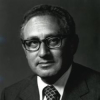Henry A. Kissinger

Henry A. Kissinger
Henry Alfred Kissingeris an American diplomat and political scientist. He served as National Security Advisor and later concurrently as United States Secretary of State in the administrations of presidents Richard Nixon and Gerald Ford. For his actions negotiating the ceasefire in Vietnam, Kissinger received the 1973 Nobel Peace Prize under controversial circumstances, with two members of the committee resigning in protest. Kissinger later sought, unsuccessfully, to return the prize. After his term, his advice has been sought by world leaders...
NationalityGerman
ProfessionStatesman
Date of Birth27 May 1923
CountryGermany
We are all the President's men.
Some of the critics viewed Vietnam as a morality play in which the wicked must be punished before the final curtain and where any attempt to salvage self-respect from the outcome compounded the wrong. I viewed it as a genuine tragedy. No one had a monopoly on anguish.
We fought a military war; our opponents fought a political one. We sought physical attrition; our opponents aimed for our psychological exhaustion. In the process we lost sight of one of the cardinal maxims of guerrilla war: the guerrilla wins if he does not lose. The conventional army loses if it does not win. The North Vietnamese used their armed forces the way a bull-fighter uses his cape.. to keep us lunging in areas of marginal political importance.
The Chinese military budget today is officially listed as, I think, about $15 billion. But even if you double it, that's only a tenth of ours. So the possibility of China challenging the United States for the next ten years over the Pacific is next to zero. There could be a conflict between us and China over Taiwan, but I think that, too, will not occur with the proper policies on both sides.
Our greatest foreign policy problem is our divisions at home. Our greatest foreign policy need is national cohesion and a return to the awareness that in foreign policy we are all engaged in a common national endeavor.
It is frankly a mistake of amateurs to believe you can gain the upper hand in a diplomatic negotiation.
If I should ever be captured, I want no negotiation - and if I should request a negotiation from captivity they should consider that a sign of duress.
Whatever must happen ultimately should happen immediately.
For other nations, utopia is a blessed past never to be recovered; for Americans it is just beyond the horizon.
In crises the most daring course is often safest.
No foreign policy - no matter how ingenious - has any chance of success if it is born in the minds of a few and carried in the hearts of none.
People are generally amazed that I would take an interest in any form that would require me to stop talking for three hours.
With respect to the relationship between nuclear weapons and the advent of détente, one has to consider two things. One, the nature of nuclear weapons in themselves, and secondly, the advent of nuclear parity.
The statesman's duty is to bridge the gap between his nation's experience and his vision.